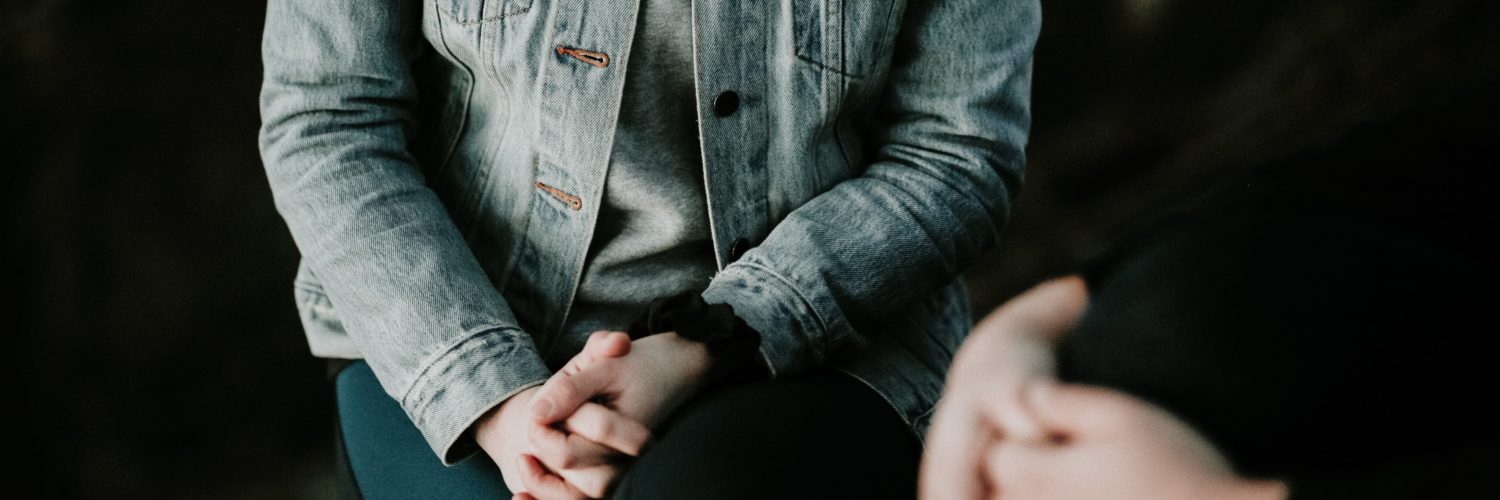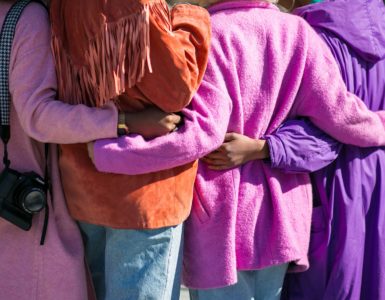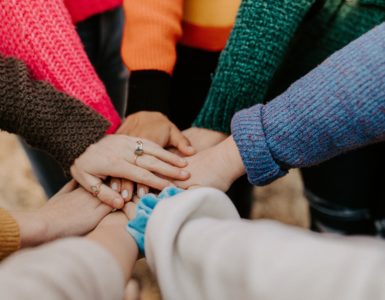“‘Adopt,’ they said. ‘It’ll be fun,’ they said!” I clasped my head in my hands as my body shook with crazed angry laughter. “What they didn’t say was, ‘Oh, by the way, that sweet little child might rage out and throw a chair at your head.’ No. That wouldn’t convince people to adopt.” I paused in my rant, took a breath, and breathed it out slowly.
As I sat in the therapist’s office, tears dripping off my face though I hadn’t realized I was even crying, I finally said out loud the horrible thing I had been thinking for months. “Maybe I’m just a really bad mom. Maybe I don’t give her consequences because I’m…afraid of her actions. A three-year-old is controlling our lives because I’m afraid of her.”
The therapist handed me a wad of tissue and leaned back into her chair, seeming to weigh my words. “Have you considered you might have PTSD? That maybe she does too, and you’re triggering each other’s trauma responses?”
I wanted to shout no. I wanted to yell that only combat soldiers and medical professionals had PTSD. I would have. But I knew better already. The truth was, she only put into words the thing I had been fearing and avoiding. My kid’s trauma caused trauma in me.
The truth of the matter is, anyone who goes through a traumatic event can develop PTSD. PTSD as described by the American Psychiatric Association is “a psychiatric disorder that may occur in people who have experienced or witnessed a traumatic event such as a natural disaster, a serious accident, a terrorist act, war/combat, or rape, or who have been threatened with death, sexual violence or serious injury…
“People with PTSD have intense, disturbing thoughts and feelings related to their experience that last long after the traumatic event has ended. They may relive the event through flashbacks or nightmares; they may feel sadness, fear or anger; and they may feel detached or estranged from other people. People with PTSD may avoid situations or people that remind them of the traumatic event, and they may have strong negative reactions to something as ordinary as a loud noise or an accidental touch.
“A diagnosis of PTSD requires exposure to an upsetting traumatic event. However, the exposure could be indirect rather than first hand.”
According to the Mind charity, symptoms of PTSD can include:
- Reliving aspects of what happened, such as
- Vivid flashbacks (feeling like the trauma is happening right now)
- Intrusive thoughts or images
- Nightmares
- Intense distress at real or symbolic reminders of the trauma
- Physical sensations such as pain, sweating, nausea, or trembling
- Alertness or feeling on edge, which may include
- Panicking when reminded of the trauma
- Being easily upset or angry
- Extreme alertness, also sometimes called ‘hypervigilance’
- Disturbed sleep or a lack of sleep
- Irritability or aggressive behavior
- Finding it hard to concentrate – including on simple or everyday tasks
- Being jumpy or easily startled
- Other symptoms of anxiety
- Avoiding feelings or memories, possibly by
- Feeling like you have to keep busy
- Avoiding anything that reminds you of the trauma
- Being unable to remember details of what happened
- Feeling emotionally numb or cut off from your feelings
- Feeling physically numb or detached from your body
- Being unable to express affection
- Doing things that could be self-destructive or reckless
- Using alcohol or drugs to avoid memories
- Experiencing difficult beliefs or feelings. This might include
- Feeling like you can’t trust anyone
- Feeling like nowhere is safe
- Feeling like nobody understands
- Blaming yourself for what happened
- Overwhelming feelings of anger, sadness, guilt, or shame
Let’s break this down a little bit at a time. Anyone can develop PTSD. Not just doctors, soldiers, EMTs, Firefighters, Police officers, or children who experience violence. Anyone. So, get that into your head first. If you’re a mama who chose adoption for your baby and your brain registered that event as a trauma, you may be experiencing PTSD. If the thought of going back to the room where you handed your baby to her new parents makes you break out in cold sweats and want to throw up, you might be suffering from PTSD and need to see a counselor.
Thankfully there is treatment. There are medications and therapies that can absolutely cure PTSD. A therapy called EMDR (Eye Movement Desensitization and Reintegration) can, after several sessions, cure PTSD by helping your brain process the trauma. The way it works is complicated to explain, but think about your brain as a breaker box. All of the power in the house goes from the breaker box to the outlets. PTSD can flip a breaker, making the appliances plugged into a certain room not work. Or PTSD can cause a break in the wire that causes problems in several rooms. EMDR goes in and rewires the brain to process the power correctly.
The damage from the trauma will still have happened, but you won’t feel it the same way. You’ll feel an appropriate amount of damage instead of an overwhelming amount. If you are experiencing symptoms that could be PTSD, see a psychiatrist and seek help. You don’t have to exist in a constant state of fight or flight.
So, you know now that anyone can experience PTSD. That also includes little kids. I have a daughter who was told her (biological) daddy would come right back, but then he left and she never said goodbye. This child is now 8. She will tear up and cry out if my husband (her adoptive daddy) gets too far ahead of the group on a family bike ride. She is experiencing her traumatic event with her whole body and feels frantic that Daddy will go away and not come back. She is working with a therapist, but she struggles with feelings of abandonment and loss.
A friend of mine has a baby that was born too early. He spent a lot of his time in the NICU being prodded and poked (for his own survival’s sake) and now as an older kid has a terrified response to seeing needles, or being in or around hospitals.
Still another child I know and love was removed from a disgusting, awful, and terrifying situation where he was systematically beaten, screamed at, thrown, denied medical treatment, and locked in closets while his parents went out. His PTSD was so bad that he couldn’t see zip ties (an item previously used to restrain him) without feeling sick to his stomach. He had hallucinations, and would often have his day disrupted by intrusive thoughts about how he was abused before CPS removed him to safety. His brain imaging would look very similar to a combat veteran’s. He is hypervigilant and terrified. Though he has been in treatment for a while now, he isn’t making steady progress because he has so much to heal from.
It fills me with existential dread if I dwell too long on the atrocities that humans have dealt out to other humans. It is perhaps because I have been so involved in first emergency services, and then later the foster care and adoption world, that I am exposed to a far higher density of tragedy than most. It may not be as terrible in the world as through the lens I have seen it. However, I am afraid that rather than being a pessimist, I am simply a realist. Be aware that going into adoption, especially foster care adoption, can cause the sort of trauma that causes PTSD.
As you can see, PTSD and dealing with the aftermath of adoption are very linked. Adoption, though beautiful, causes huge feelings, feelings for everyone in the adoption triad: birth family, adoptive family, and the adoptee. Where giant feelings abound, there is the opportunity for PTSD.
There are several books that address this topic, and if you are looking for further reading and insight, I suggest you pick these up either online or at your local library. I have found that for me personally, listening to an audiobook while doing another task such as house cleaning or working out helps me to absorb the information better, so if you don’t have as much time to sit and read a book, I’d suggest finding an audio version to listen to. Here are some books to consider.
- The Body Keeps the Score by Bessel A. van der Kolk, M.D.
Reader beware, this book will make you think, and if you are like me, probably cry. It is not a casual read, but a deep dive into what happens to a body that is in trauma. I read this book and was much better able to identify what was going on with my kids and myself. I highly recommend this book. If you only have time for one, I’d suggest this one.
- A Path to Recovery for Mothers Who Lost Children to Adoption by Joe Soll and Karen Wilson Buterbaugh
I haven’t read this book myself, but it is highly recommended for mamas who have chosen adoption for their child and are experiencing PTSD and depression.
- Being Adopted by David M. Brodzinsky, Robin Marantz Henig, and Marshall D. Schecter
As the title says, this book is from the adoptee’s point of view. Insightful and helpful in understanding what an adoptee might feel.
- Primal Wound by Nancy Verrier
I do not love this book. Not because it is badly written or because I feel like it says anything untrue. I simply hate how I felt when I started to read it. I felt hopeless and angry. However, I didn’t finish it that way. I feel like I understand my children better now, and if you have time, I suggest you pick this one up too.
- Coming Home to Self: The Adopted Child Grows Up by Nancy Newton Verrier
The same author as the Primal Wound. Very knowledgeable on the topic and well written by the author.
- Journey of the Adopted Self: A Quest For Wholeness by Betty Jean Lifton, PhD.
I have only heard of this book, not read it, but it has been recommended.
- The Connected Child: Bring Hope and Healing to Your Adoptive Family by Karen Purvis, David R. Cross, Wendy Lyons Sunshine
If you only have time for two books, pick up this one and the one at the top of the list. This book is full of practical how-to suggestions, and furthermore, offers hope as the writers share victories of adoptive parents and children.
- The Connected Parent by Karen Purvis and Lisa Qualls
Though similar to the one above, this book is not the same. I like this book because it offers helpful suggestions in easy-to-digest bites. It is a great resource for adoptive parents who are hoping to build connections and overcome feelings that develop because of PTSD from secondary trauma.
- Adopting a Child with a Trauma & Attachment Disruption History by Theresa Fraser
This book helps to explain what a child who has faced rejection will feel and may do. It is for sure a read if you are considering adopting a child who had a disrupted adoption placement or was considered “unadoptable.” While I never want to discourage anyone from adopting a child in need, I think this book is important to understand what you’re saying yes to if you adopt a child with attachment issues.
- After the Storm: Healing after Trauma, Tragedy and Terror by Kendall Johnson
This book is a more general, not-adoption-focused book, but it can still help with healing from a difficult event.
There are other books I am sure that are good reads, but these are the ones that either I have read personally or were recommended to me by friends. I hope you now understand a little bit better what PTSD actually is, and how or why someone might suffer from it. Remember that it can happen to anyone. If you or a loved one are having PTSD symptoms and have recently been through a major trauma (like, the whole world shutting down and a bunch of people dying from a virus maybe), I suggest you talk to a doctor, psychiatrist, or psychologist. Seek out help.
Are you and your partner ready to start the adoption process? Visit Adoption.org or call 1-800-ADOPT-98 to begin your adoption journey. We have 130+ years of adoption experience and would love to help you.



